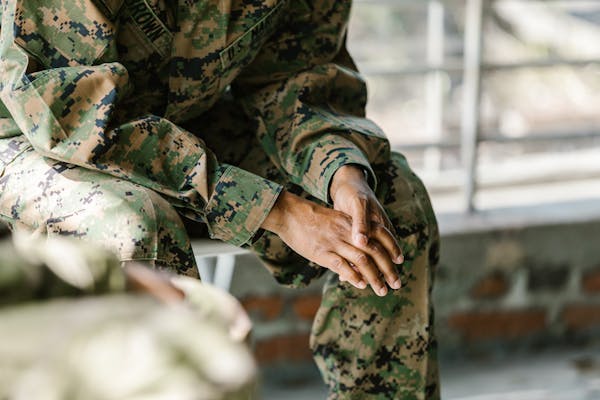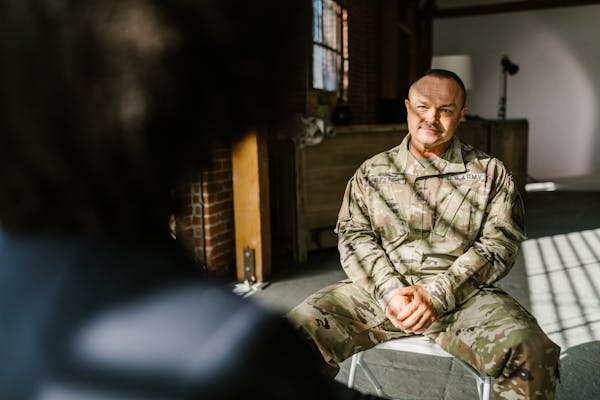Veterans are the embodiment of courage, sacrifice, and resilience. They have dedicated their lives to serving their countries, often facing unimaginable challenges and dangers in the process. However, the transition from military to civilian life can be fraught with difficulties, particularly when it comes to mental health. The importance of providing adequate mental health support for veterans cannot be overstated. It’s not just about fulfilling a duty to those who have served; it’s about honoring their sacrifice and ensuring they receive the care and support they need to lead fulfilling lives post-service.
The Invisible Wounds of War:
The Toll of Untreated Mental Health Issues:
When mental health issues go untreated, the consequences can be devastating, especially for veterans. Veterans struggling with PTSD may experience debilitating flashbacks, nightmares, and hypervigilance, making it difficult for them to function in everyday life. Depression and anxiety can rob veterans of their joy and sense of purpose, leaving them feeling hopeless and isolated.
Substance abuse often becomes a coping mechanism for dealing with the pain and trauma of war, further exacerbating their mental health struggles. Access to Mental Health Support for Veterans is crucial in addressing these challenges and helping them reclaim their well-being and stability.
Moreover, untreated mental health issues among veterans can have ripple effects that extend far beyond the individual. Families may bear the brunt of their loved one’s suffering, experiencing strained relationships, financial difficulties, and emotional turmoil. Communities also suffer when veterans are unable to reintegrate successfully, as they lose out on the unique skills, experiences, and perspectives that veterans bring to the table. It’s imperative to prioritize Mental Health Support for Veterans to ensure their successful reintegration into civilian life and the overall well-being of society.
The Importance of Culturally Competent Care:
Providing effective mental health support for veterans requires a comprehensive approach that addresses their unique needs and experiences. Veterans have often been exposed to trauma and stressors that are distinct from those encountered by the general population, necessitating specialized care tailored to their backgrounds and experiences.
Culturally competent care for veterans involves understanding and respecting the military culture, including its values, traditions, and language. It also requires recognizing the impact of military service on veterans’ identities and sense of self, as well as the challenges they may face in transitioning to civilian life. By acknowledging and validating veterans’ experiences, mental health providers can create a safe and supportive environment where veterans feel comfortable seeking help and discussing their struggles openly.
Access to Timely and Effective Treatment:
Ensuring timely and effective mental health treatment for veterans is crucial. Many veterans face obstacles to care, such as long wait times and limited specialized services. Affordable options are also scarce, compounding the issue. One solution lies in bolstering Mental Health Support for Veterans, a concerted effort involving policymakers, healthcare providers, and community organizations to expand access to services and diminish the stigma around seeking help.
Telehealth and telemedicine offer promising avenues to improve access, particularly for veterans in rural or underserved areas. By facilitating virtual appointments, these technologies enable veterans to consult mental health providers from their homes, bypassing geographical constraints and minimizing travel burdens. Moreover, telehealth services are flexible, accommodating veterans’ busy schedules and ensuring they receive timely care.
The Role of Peer Support and Community Engagement:
Benefits of Mental Health Support for Veterans:

- Addressing Trauma: Many veterans have experienced traumatic events during their service, which can lead to conditions like PTSD (Post-Traumatic Stress Disorder). Mental health support provides a safe space for veterans to process their experiences and learn coping mechanisms to manage trauma-related symptoms.
- Preventing Suicide: Veterans are at a higher risk of suicide compared to the general population. Mental health support can provide interventions and resources to prevent suicides by addressing underlying mental health issues and providing support during times of crisis.
- Improving Quality of Life: Mental health conditions can significantly impact a veteran’s quality of life, affecting relationships, employment, and overall well-being. Access to mental health support services can help veterans regain stability and improve their overall functioning.
- Addressing Substance Abuse: Many veterans struggle with substance abuse issues, which often co-occur with mental health conditions. Mental health support programs can offer integrated treatment approaches that address both substance abuse and underlying mental health issues.
- Supporting Reintegration: Transitioning from military to civilian life can be challenging, and mental health support can facilitate this process by addressing issues related to adjustment, identity, and reintegration into civilian society.
Overall, mental health support for veterans is essential for ensuring their well-being, successful reintegration into civilian life, and the overall health of the veteran community.
Building Supportive Communities:

- Peer Support Programs:
- Community Engagement:
Tailoring Treatment to Individual Needs:
- Culturally Competent Care: Understanding the importance of culturally competent care, especially in the context of Mental Health Support for Veterans, is essential for meeting the unique needs of those who have served. Military culture encompasses a distinct set of values, traditions, and norms that significantly impact veterans’ attitudes toward mental health and their willingness to seek support. Mental health providers who possess insight into and reverence for military culture are better equipped to establish meaningful connections with veterans, foster trust, and deliver personalized treatment that addresses their specific requirements.
- Holistic Approach: Mental health support for veterans should take a holistic approach that addresses the interconnected nature of physical, emotional, and social well-being. This may involve integrating mental health services with other aspects of care, such as primary care, substance abuse treatment, vocational rehabilitation, and social services, to provide comprehensive support that addresses veterans’ diverse needs and goals.
Conclusion:
Providing adequate mental health support for veterans is not just a moral imperative but a societal necessity. Veterans, who embody courage and sacrifice, often face invisible wounds of war, including PTSD, depression, and substance abuse, which can profoundly impact their well-being and reintegration into civilian life. Untreated mental health issues not only affect veterans individually but also have ripple effects on their families and communities.
Therefore, it’s essential to prioritize culturally competent care, timely access to treatment, peer support, and community engagement to address veterans’ mental health needs comprehensively. By investing in Mental Health Support for Veterans and fostering supportive communities, we can honor their service, alleviate their suffering, and ensure they lead fulfilling lives beyond the military.



